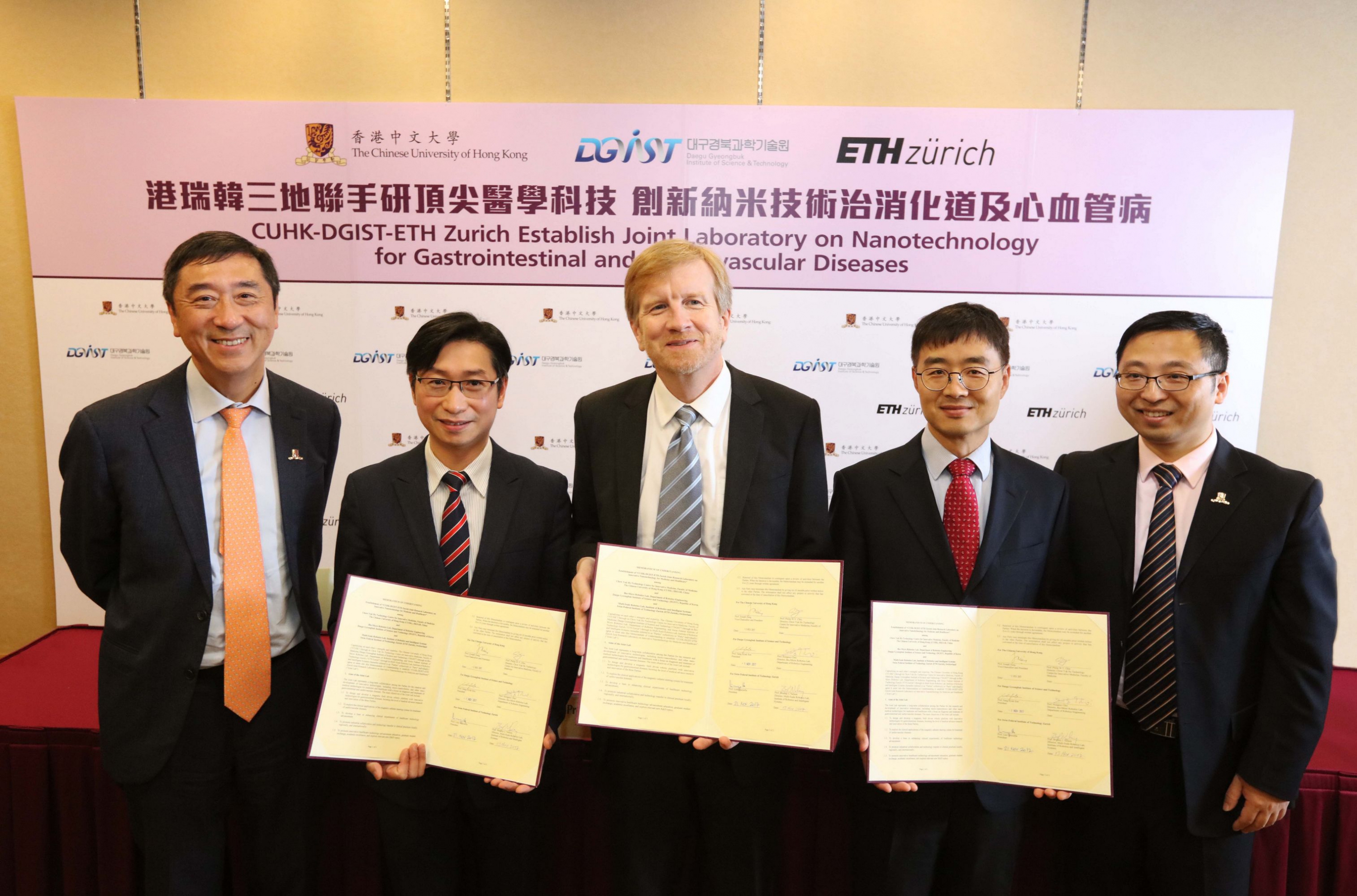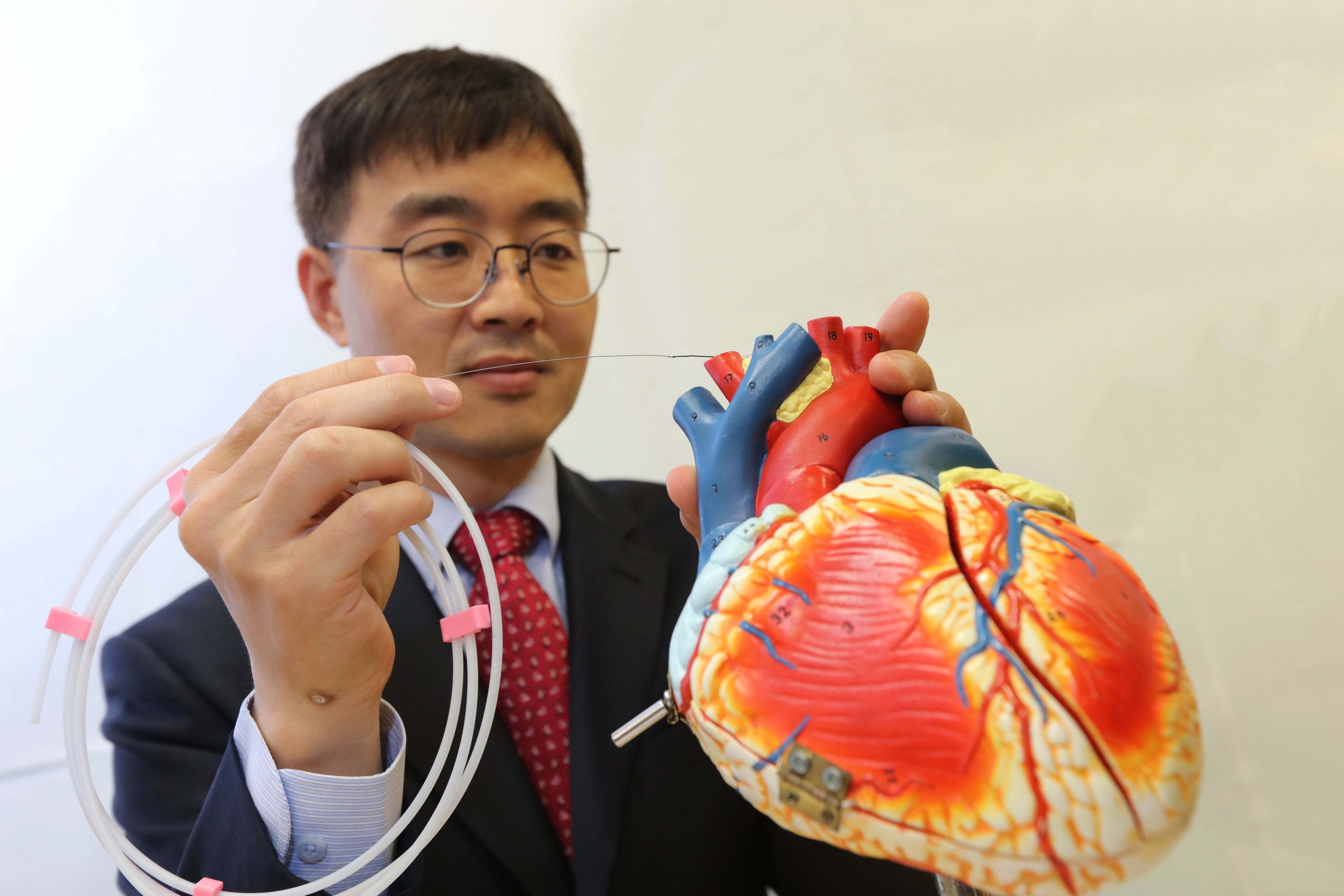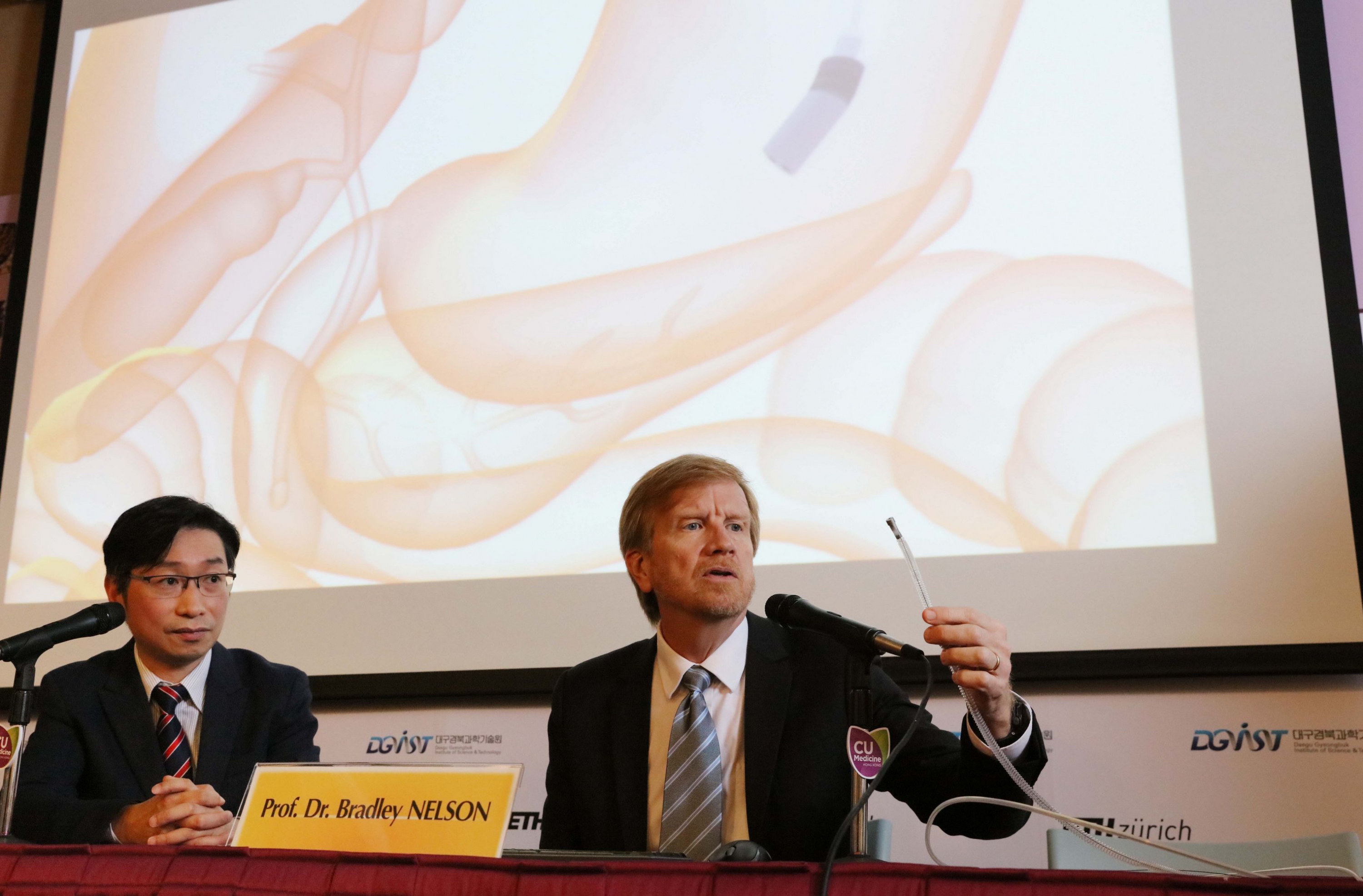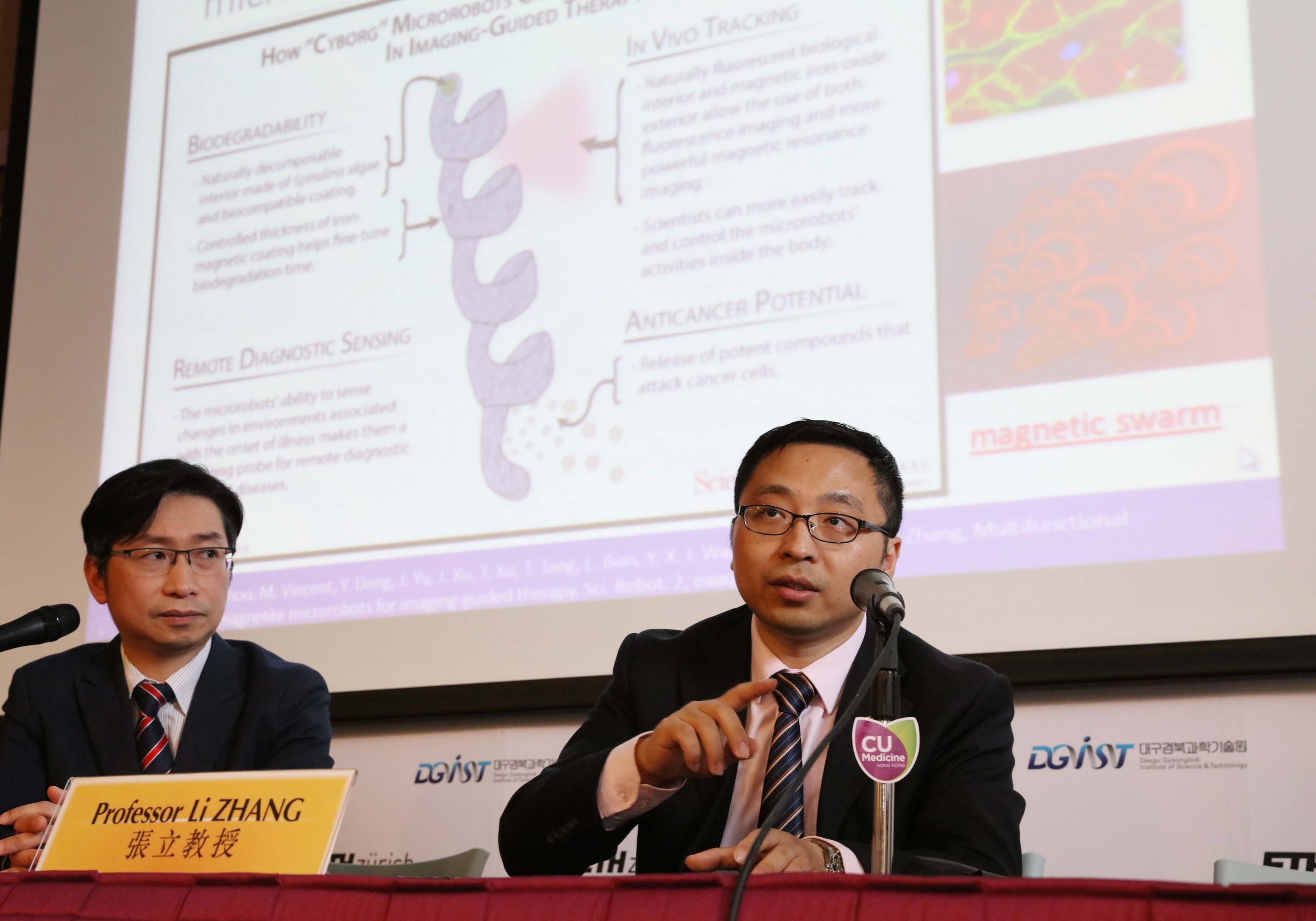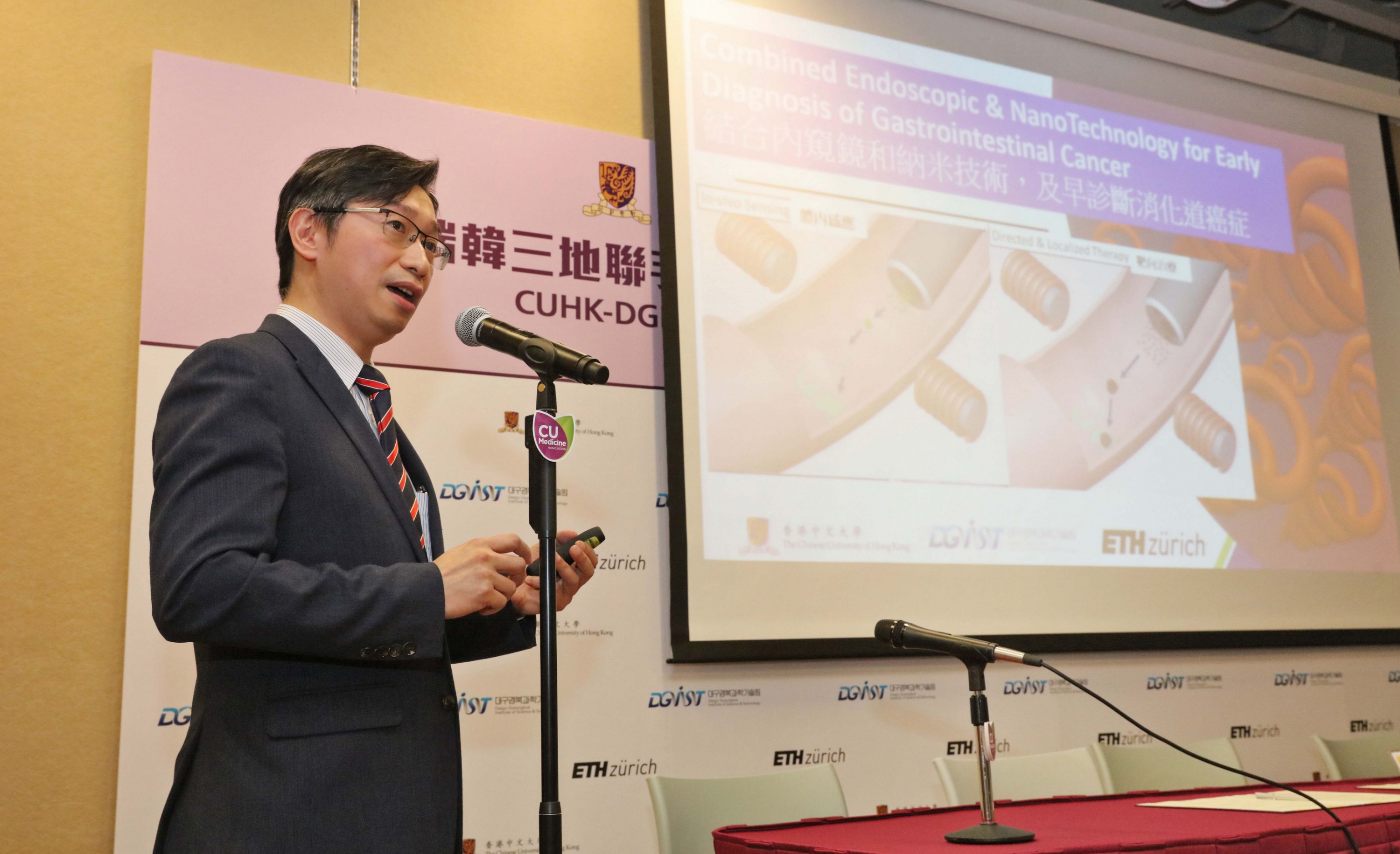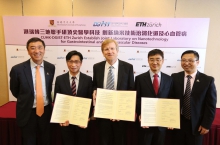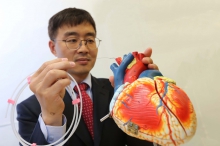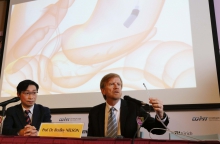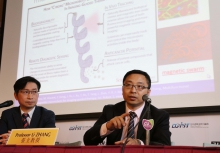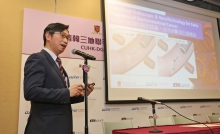CUHK
News Centre
CUHK-DGIST-ETH Zurich Establish Joint Laboratory on Nano-technology for Gastrointestinal and Cardiovascular Diseases
The Chinese University of Hong Kong (CUHK), the Daegu Gyeongbuk Institute of Science and Technology (DGIST), South Korea and the Swiss Federal Institute of Technology Zurich (ETH Zurich), Switzerland are collaborating to establish a Joint Research Laboratory on Innovative Nanotechnologies for Medicine and Healthcare (Joint Lab). The Joint Lab aims to promote the research and development of innovative technologies, including micro-/nano-robotics and other nano-medical technologies for the diagnosis and treatment of gastrointestinal (GI) and cardiovascular (CV) diseases.
Limited technologies for managing GI & CV diseases
GI and CV diseases are among the commonest diseases worldwide. GI cancers including esophagus, stomach and colon are among the top ten major cancers worldwide, while CV diseases including ischemic heart diseases and stroke rank as top causes of mortality. World Health Organisation (WHO) figures show that about 18 million people died from CV diseases in 2015, which counts for over 30% of overall mortality. The Department of Health in Hong Kong has also recently predicted that over the next 10 years, 1 in 10 among persons aged 30 to 74 may suffer from CV events such as coronary heart disease, stroke, peripheral artery disease or heart failure.
However, there are unmet needs and limitations in the current medical technologies to manage and treat these diseases. Micro-/nano-robotics and nano-technologies are seen as one of the potential areas which will enhance clinical management and care for patients. In the midst of these clinical needs, the three world-renowned universities: CUHK, DGIST and ETH Zurich are establishing a joint lab to study how to adopt these innovative technologies for GI and CV diseases.
Prof. Joseph SUNG, Vice-Chancellor and President of CUHK hailed the collaboration and said, ‘DGIST and ETH Zurich are both renowned globally of their leading roles in the advancement of science and technology, particularly in the innovative micro-robotics and nano-technology area. Together with CUHK’s strong foundation of clinical researches and its dedication to the development of healthcare innovation and biomedical engineering, we envision a tripartite collaboration in which we will capitalize on each other’s strengths and expertise and work out some very innovative solutions for both GI and CV. Our ultimate goal is to meet the unmet needs and better treat GI and CV patients worldwide.’
Tripartite collaboration in developing innovative technologies for clinical applications
The Joint Lab carries the mission to promote collaborative research and academic exchange, as well as to accelerate technology transfer for clinical applications and training with a focus on GI and CV diseases.
Prof. Dr. Bradley NELSON, Director of the Multi-Scale Robotics Lab, Institute of Robotics and Intelligent Systems, ETH Zurich remarked, ‘Our Multi-Scale Robotics Lab is a highly multi-disciplinary group with focuses on robotics and systems. We also have a strong research strength in developing tools and processes required for fabricating and assembling micro-sized robots and nano-meter scale robotic components. We have been collaborating with DGIST since 2013 to develop innovative technology for CV diseases. In March this year, we forged an alliance partnership with CUHK to explore innovative technology for the medical treatment of GI diseases. And now, we have connected the bridges and work in synergy to create more possibilities.’
Prof. Hongsoo CHOI, Director of the Bio-Micro Robotics Lab, Department of Robotic Engineering, DGIST, echoed this. ‘As Korea (South Korea)’s leading institute in science and technology, we have our Bio-Micro Lab with expertise in microrobotics for biomedical applications. We established the DGIST-ETH Microrobotics Research Center (DEMRC) with ETH Zurich in 2013 to develop medical microrobots and new minimally invasive technology for innovative treatments of CV diseases. From there, we started a project using magnetic-field-guided catheter and micro-robotics technology for intervention in blocked arteries. And now, we are furthering collaboration on this, with CUHK, enabling technology for translational and clinical research on CV disease.’
Initiation of three key research topics under Joint Lab
The tripartite alliance will focus on three research topics in the coming five years including i) innovative technologies for complete examination of the small intestine, ii) the study of intestinal diseases/conditions which are particularly difficult to diagnose and treat using existing technologies, and iii) innovative technologies for treatment of GI and CV diseases.
In practice, the research team will design and develop a magnetic field driven robotic platform with innovative technologies for GI diseases, and develop an innovative magnetic guided endoscope for small intestine check-up which is believed will greatly reduce the time for a complete examination to 30 minutes, half the time needed for a conventional one. As well as this, researchers will explore the clinical applications of the magnetic catheter steering system, for treating CV diseases.
Prof. Philip CHIU, Director of the Chow Yuk Ho Technology Centre for Innovative Medicine, CUHK, said, ‘The CUHK Faculty of Medicine has been well known for its research strength in GI diseases. Our studies have modified clinical guidelines in preventing and treating ulcer bleeding in many countries around the world, found early tumor markers for GI cancers, and advanced GI-related endoscopic surgery. Scholars from the CUHK Faculty of Engineering are also very experienced in medical robotics. We believe our collaboration with DGIST and ETH Zurich will further sharpen our edge in these fields, and we expect to mark a milestone in local as well as global healthcare technology advancement. Most important of all, we strive to provide more and better treatment options to GI and CV patients.’
Tripartite alliance offers exchange and training opportunities
Apart from research projects, another main objective of the tripartite alliance is to provide both faculty members and students from the three universities with the opportunity to have intercontinental and cross-disciplinary skills and knowledge transfer.
The tripartite collaboration will organize regular faculty exchanges and annual workshops for members to share their research progress and to enhance in-depth exploration of areas of common interest. The alliance also plans to set up an annual research summer school for students from the three universities, to learn state-of-the-art medical robotics technologies and be exposed to institution-specific facilities and, most importantly, to exchange with and learn from one another.
About The Chinese University of Hong Kong (CUHK)
Founded in 1963, The Chinese University of Hong Kong (CUHK) is a forward-looking comprehensive research university with a global vision and a mission to combine tradition with modernity, and to bring together China and the West.
The Faculty of Medicine, CUHK was set up to meet the needs of society by providing graduates with the professional development and knowledge that equips them to be caring and competent medical practitioners. As a young medical school established in 1981, the Faculty ranks among the world’s top 50 medical schools in the QS World University Rankings by Subject 2017. The University also has an excellent record of published research, both in discipline-specific journals and in more high-profile publications such as Science, Nature, The New England Journal of Medicine and The Lancet. http://www.cuhk.edu.hk
About Daegu Gyeongbuk Institute of Science and Technology (DGIST)
DGIST is one of the four Institutes of Science and Technologies (ISTs) in South Korea which demonstrates a leading role in the advancement of science and technology.
DGIST started with a research institution in 2004 and grew into a research-oriented university by opening a graduate programme in 2011 and an undergraduate programme in 2014. DGIST has been growing as a leading university of science and engineering with its aim to facilitate national advancement by nurturing talented individuals through its innovative convergence of education and research. During the past 10 years, DGIST has become exceptionally innovative and made remarkable advances with the idea of becoming ‘a world-leading convergence research university’. http://www.dgist.ac.kr
About Swiss Federal Institute of Technology Zurich (ETH Zurich)
ETH Zurich has been named the world’s 5th best university in the 2017 QS Rankings for engineering and technology subjects. Over 20 Nobel Prize laureates have or had a connection with the University, including Albert Einstein.
Founded by the Swiss Federal Government in 1855, ETH Zurich carries a mission to educate engineers and scientists. With a long history and world-renowned reputation, it serves as a national centre of excellence in science and technology in Switzerland. https://www.ethz.ch
(From left) Prof. Joseph SUNG, Vice-Chancellor and President of CUHK; Prof. Philip CHIU, Director of the Chow Yuk Ho Technology Centre for Innovative Medicine, CUHK; Prof. Dr. Bradley NELSON, Director of the Multi-Scale Robotics Lab, Institute of Robotics and Intelligent Systems, ETH Zurich; Prof. Hongsoo CHOI, Director of the Bio-Micro Robotics Lab, Department of Robotic Engineering, DGIST and Prof. Li ZHANG, Associate Professor, Department of Mechanical and Automation Engineering, CUHK, take a group photo after signing the MOU to establish a Joint Research Laboratory on Innovative Nanotechnologies for Medicine and Healthcare
Prof. Hongsoo CHOI (right), Director of the Bio-Micro Robotics Lab, Department of Robotic Engineering, DGIST demonstrates a guidewire-based microrobot which may be used for a robot-assisted percutaneous coronary intervention procedure
Prof. Dr. Bradley NELSON (right), Director of the Multi-Scale Robotics Lab, Institute of Robotics and Intelligent Systems, ETH Zurich displays animation of an innovative magnetic guided endoscope for small intestine check-up
Prof. Li ZHANG (right), Associate Professor, Department of Mechanical and Automation Engineering, CUHK says in combination with endoscopy, microbots can help enhance the imaging contrast, direct drug delivery and provide localized therapy with high precision in vivo


